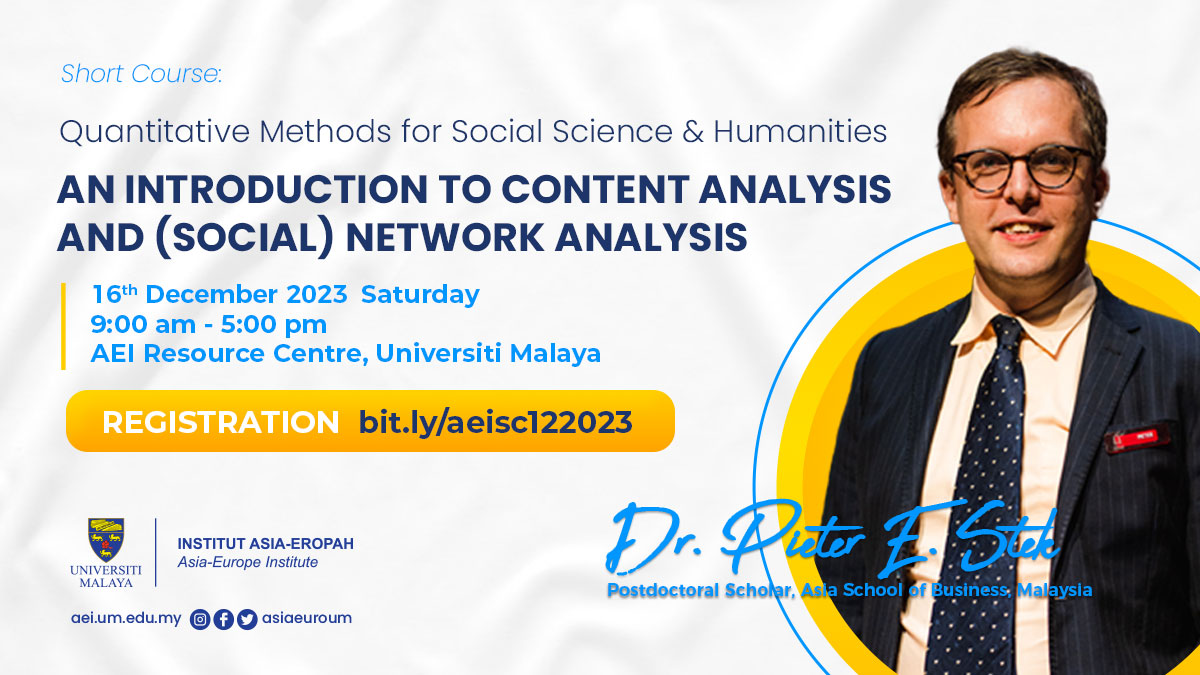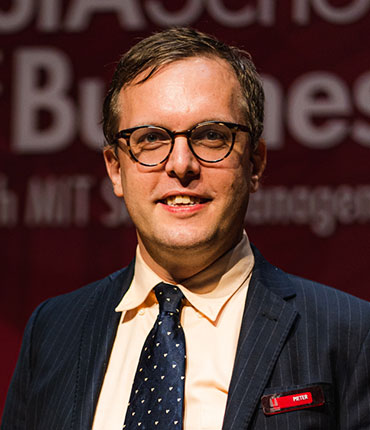
Instructor: Dr. Pieter E. Stek, Postdoctoral Scholar, Asia School of Business, Malaysia
Date: 16 December 2023 (Saturday)
Time: 9:00 am - 5:00 pm
Venue: Resource Centre, Asia-Europe Institute, Universiti Malaya
Quantitative methods have become increasingly accessible for social science and humanities research due to the digitization of information, easy accessibility through the internet, and low cost computing power. Social sciences and humanities scholars who possess some basic quantitative techniques can use them to “turbo charge” their research by automating and scaling-up their data gathering and processing, and approaching research questions with a new toolbox. Quantitative analytical skills are also in high demand by many employers, as the ability to analyze complex social phenomena and layered communication messages is also suitable training for analytical roles in the public or private sector post-graduation.
Ensuring that social science and humanities scholars acquire literacy in quantitative methods also has broader societal importance. One of the great problems of the “data science”-era is a lack of understanding by analysts of the meaning and context of the data, models and results that they work with. Training social scientists and humanities scholars who are able to "speak the language" of data science and understand the context can therefore play an important role in bridging this knowledge gap.
This course is intended for social science and humanities scholars who are interested in using quantitative methods in their research. The course assumes minimal prior knowledge about the methodologies to be covered, but it does assume some background in working with R, a popular statistical computing language. However, participants who are not familiar with R before the start of the course may still benefit by seeing what kind of methods exist and how they can be implemented. Specific examples will be shown in R (and relevant code provided), and participants can refer to this code later on, when doing their own work.
Course participants should gain the following skills and knowledge upon completion of the course:
Participants are requested to bring their own laptops with R and R Studio installed.
For those not familiar with R, please read the following tutorial and install R and R Studio (free version) on your laptop. Links and instructions for installation can be found here. If you have time and interest, you can also take a look at https://rstudio-education.github.io/hopr/ to teach yourself some basic programming before the session.
The course is divided into four sessions which are built around different methodological approaches, R packages and data examples. Each session begins with an explanation of the methodology and the use case, which is followed by a worked example in R. If time allows, participants can work on their own application, or do so in their free time afterwards.
Session 1: Web Scraping and RSS Feeds (9:00 am - 10:30 am)
Explanation of web pages (HTML) and RSS feeds, how they can be scraped with rvest and tidyRSS, how data can be accessed, and the legal issues surrounding web scraping. Example of automatically scraping a series of webpages.
Break: (10:30 am - 11:00 am)
Session 2: Content Analysis of a Google News feed (11:00 am - 12:30 pm)
Special case of using Google RSS feeds to gather news articles using tidyRSS and then doing quantitative text analysis using quanteda in R.
Lunch Break: (12:30 pm - 1:30 pm)
Session 3: Social Network Analysis with A Tale of Two Cities (1:30 pm - 3:00 pm)
Example of how the social network of a book can be analyzed by first identifying characters in the text using basic R code, and then doing a network analysis to visualize the relationship between characters.
Break: (3:00 pm - 3:30 pm)
Session 4: Network Analysis with Patent Inventor Data (3:30 pm - 5:00 pm)
Example of building co-occurrence (or co-authorship) networks with basic R codes from patent inventor data, and then carrying out network analysis.
 Dr. Pieter E. Stek is a Postdoctoral Researcher at the Center for Technology, Strategy and Sustainability and the ASEAN Research Center at the Asia School of Business. He specializes in the geography of knowledge production and technological change, the diffusion and impact of sustainability standards, and in social science research methodology.
Dr. Pieter E. Stek is a Postdoctoral Researcher at the Center for Technology, Strategy and Sustainability and the ASEAN Research Center at the Asia School of Business. He specializes in the geography of knowledge production and technological change, the diffusion and impact of sustainability standards, and in social science research methodology.
He received Master degrees in Civil Engineering from the University of Twente (The Netherlands) and in International Relations from Yonsei University (South Korea). He obtained his doctorate from the Faculty of Technology, Policy and Management at Delft University of Technology (The Netherlands). His doctoral research centered on the spatial development and global networks of high technology clusters using patent data. He is currently the Managing Editor of Quality and Quantity, a multidisciplinary social science methodology journal published since 1967.
Prior to joining ASB, Dr. Stek was Chief Analyst at AppliedHE, a Singapore-based higher education evaluation and technology start-up. He also worked in managerial roles at QS Quacquarelli Symonds and Sungkyunkwan University. While pursuing his doctorate, Dr. Stek served as adjunct lecturer at Jeonbuk National University, Myongji University and Yeungnam University (South Korea), teaching courses related to economics, management and the internet, and also worked as science reporter for Seoul's TBS eFM radio.
AEI students: Free
UM students/UM graduates: RM50
Public: RM100
STEP 1: Pay the fee at epay.um.edu.my (select category: AEI - Programs)
STEP 2: Upload your E-Pay Official Receipt at https://bit.ly/aeisc122023
*This short course is part of our upskilling program and we encourage all AEI and UM graduates to attend. Certificate of course completion will be provided.
Participants are requested to bring their own laptops with R and R Studio installed.
For those not familiar with R, please read the following tutorial and install R and R Studio (free version) on your laptop. Links and instructions for installation can be found here. If you have time and interest, you can also take a look at https://rstudio-education.github.io/hopr/ to teach yourself some basic programming before the session.
Last Update: 30/11/2023